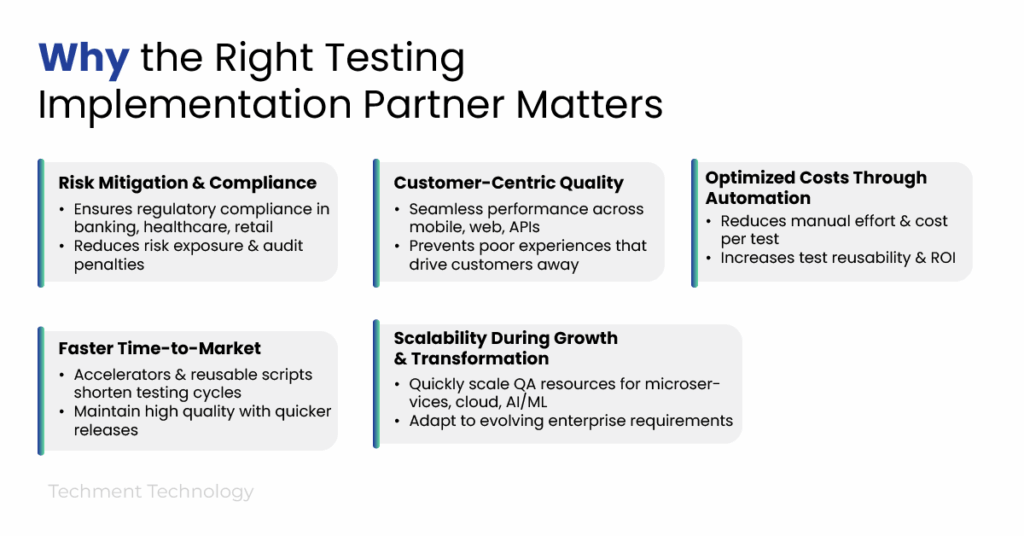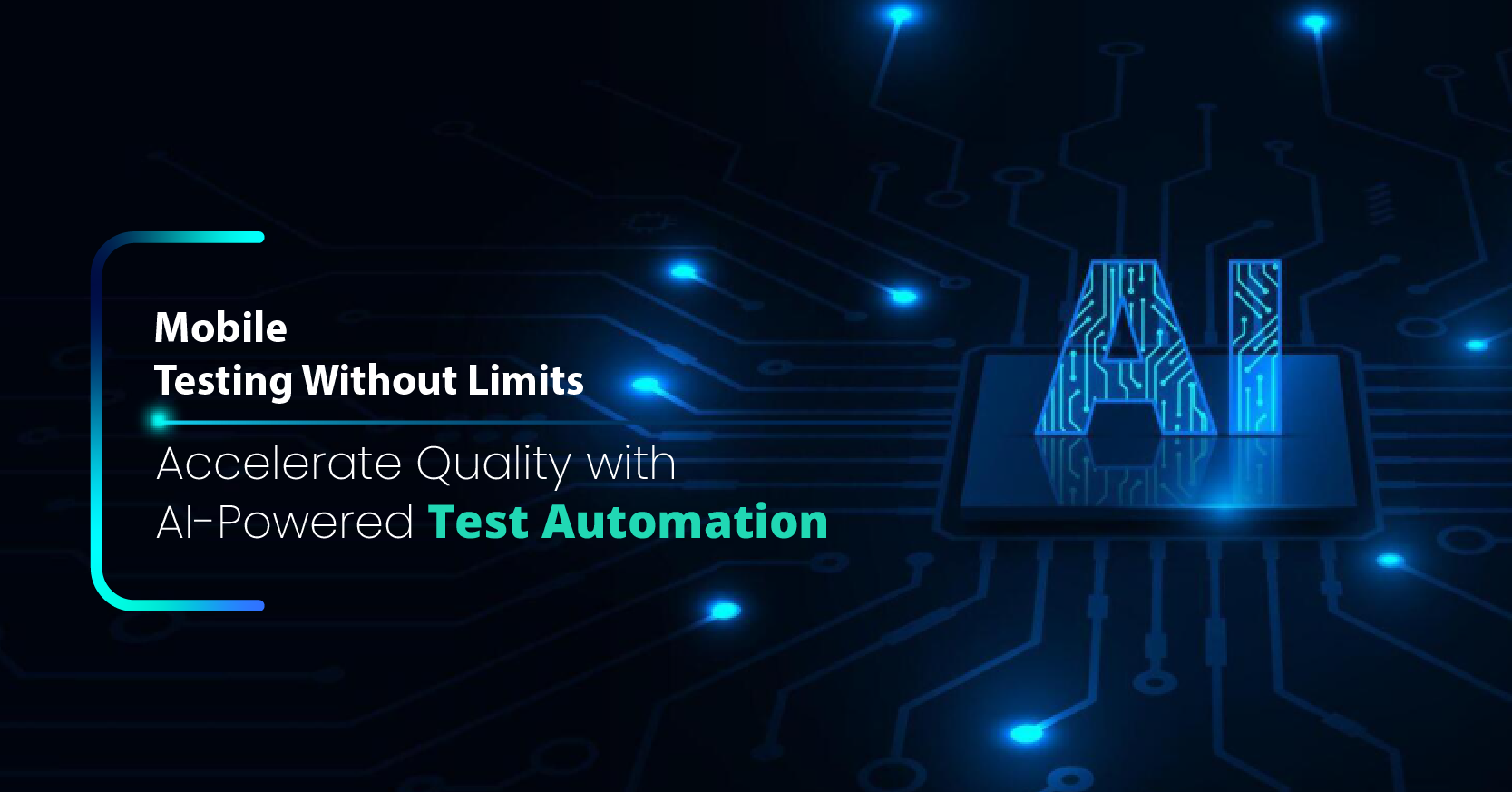In today’s fast-paced digital economy, enterprises cannot afford software failures. A single defect can cost millions, damage brand reputation, and erode customer trust. According to the Consortium for IT Software Quality, poor software quality cost U.S. companies $2.41 trillion in 2022 — a staggering figure that underlines the importance of rigorous software testing and quality assurance.
Yet, despite massive investments in development, many enterprises struggle to establish testing practices that balance speed, cost, and quality. This is why partnering with the best testing implementation partner has become a strategic priority for CTOs, product leaders, and digital transformation heads.
The challenge is clear: How do you identify, evaluate, and select a partner who can align with your enterprise requirements, scale with your growth, and deliver tangible ROI from QA and test automation?
This blog provides a comprehensive, step-by-step guide to selecting the right testing partner — blending data-backed insights, industry frameworks, and actionable recommendations.
TL;DR: Key Takeaways
- Choosing the best testing implementation partner is critical for enterprise resilience, customer experience, and digital transformation.
- Evaluation must cover technical expertise, domain knowledge, automation capabilities, scalability, and cultural alignment.
- Data-driven vendor assessment frameworks help reduce risks in selecting the right QA implementation partner.
- Long-term success requires strategic collaboration, not transactional outsourcing.
- Enterprises should emphasize AI-powered test automation and continuous testing practices to stay competitive.
For a deep dive into Techment’s QA capabilities, explore our Quality Assurance Services.
Why Choosing the Best Testing Implementation Partner Matters
The consequences of inadequate testing are not just technical failures — they directly translate into business risks and lost opportunities. When enterprises evaluate digital initiatives, the speed of delivery and the quality of customer experience are often competing priorities. The right testing implementation partner helps you balance both.
Here’s why this decision is so critical:
- Risk Mitigation & Compliance Assurance
In industries like banking, healthcare, and retail, non-compliance with data and security regulations can result in multi-million-dollar penalties. A robust enterprise QA partner ensures that compliance testing and audit-readiness are embedded from the start, reducing risk exposure. - Faster Time-to-Market Without Sacrificing Quality
Modern digital products are expected to release features frequently. The right partner brings accelerators, reusable automation scripts, and frameworks that reduce testing cycles while maintaining coverage. This ensures faster delivery with fewer post-release defects. - Customer-Centric Quality
A study by PwC revealed that 32% of customers stop doing business with a brand after a single bad experience. With customer journeys now spanning mobile, web, and APIs, a testing partner ensures seamless performance across touchpoints. - Optimized Costs Through Automation
Manual-heavy testing approaches often lead to cost overruns. Partners with strong test automation capabilities lower the cost per test case, increase reusability, and improve ROI across projects. - Scalability During Growth or Transformation
Enterprise transformations (like migrating to microservices, adopting cloud-native platforms, or integrating AI/ML systems) demand flexible QA capabilities. A strategic partner can quickly scale up resources, provide specialized skills, and adapt to evolving requirements.
Related Insight: Top Software Testing Trends 2025: AI & ML Take Charge
Key Evaluation Criteria for Selecting a Testing Partner
Selecting the best testing implementation partner is not just about technical skills. It requires a holistic evaluation framework that balances technical, strategic, and cultural factors. Below are the expanded evaluation criteria decision-makers should prioritize:
- Technical Expertise & Tools Mastery
Your partner should demonstrate end-to-end testing expertise across functional, performance, security, and automation domains. Look for:
- Automation-first mindset with tools like Selenium, Appium, Tricentis Tosca, Testim, and Cypress.
- AI-driven testing capabilities (self-healing scripts, predictive defect analytics).
- Integration with CI/CD pipelines to support DevOps and continuous testing.
- Cloud-native testing environments leveraging AWS, Azure, and GCP.
- Performance and load testing for enterprise-scale systems.
Actionable Tip: Request proof of tool certifications and case studies showcasing their success with similar tech stacks.
Learn how Techment applies AI-driven frameworks in Boosting Test Automation Resilience.
- Domain Knowledge & Industry Context
Enterprises need partners who understand the unique challenges of their sector. Generic QA cannot guarantee compliance or customer satisfaction in highly regulated industries.
- Banking & Finance: High focus on regulatory compliance (PCI DSS, SOX), fraud detection, and security testing.
- Healthcare: HIPAA compliance, patient safety validation, and interoperability testing across devices.
- E-commerce & Retail: High-volume performance testing, UX validation, and integration with payment systems.
- Telecom: Scalability testing for network-heavy applications and OSS/BSS systems.
Actionable Tip: Check for domain accelerators (pre-built frameworks, templates, and compliance checklists) tailored to your industry.
Explore Techment’s Test Automation Implementation Services.
- Scalability & Global Delivery Model
A strong testing partner must align with enterprise growth and global operations. Look for:
- Flexible engagement models: Onshore, offshore, or hybrid to optimize cost and speed.
- Round-the-clock support: 24/7 QA coverage to enable global release schedules.
- Elastic resourcing: Ability to scale up quickly during peak release cycles.
- Multi-location delivery: Ensures resilience in case of regional disruptions.
Actionable Tip: Ask for client references where the vendor scaled teams during enterprise-wide transformation projects.
Related Insight: Mobile Testing Without Limits.
- Cultural & Strategic Alignment
Technical skills alone cannot guarantee long-term success. The cultural alignment of your partner is a key differentiator.
- Shared KPIs: Ensure they measure success with business-aligned metrics (e.g., customer defect rate, release velocity).
- Transparency & communication: Frequent reporting, dashboards, and proactive escalation mechanisms.
- Co-innovation mindset: Willingness to adopt emerging technologies and experiment with pilots.
- Long-term value creation: Not just meeting SLAs, but enabling enterprise digital transformation.
Actionable Tip: Conduct cultural alignment workshops to assess their approach to collaboration, agility, and innovation.
Service Link: Test Automation Assessment.
Data & Stats Snapshot
- $2.41 trillion: Cost of poor software quality in U.S. enterprises (CISQ, 2022).
- 70%: Enterprises projected to rely on independent testing providers by 2025 (Gartner).
- 30% faster delivery: Enterprises with strong vendor collaboration (McKinsey).
- 85%: Of enterprises will adopt AI-driven testing practices by 2026 (Accenture).
To learn how AI is redefining enterprise QA, read: Vision AI… Transforming Test Automation.
Strategic Recommendations
Selecting the best testing implementation partner is not a one-time procurement exercise; it’s a strategic investment that influences enterprise agility, customer satisfaction, and long-term ROI. Based on industry best practices and insights from Gartner, McKinsey, and Accenture, here are detailed recommendations enterprises should follow:
- Adopt a Structured Vendor Scorecard
Many enterprises make decisions based on cost and capability presentations alone. Instead, develop a vendor scorecard with weighted criteria across technical, business, and cultural dimensions.
- Key dimensions to score:
- Technical expertise (tools, automation, frameworks).
- Domain knowledge (compliance, sector-specific accelerators).
- Scalability (ability to support global rollouts, elastic team size).
- Communication & collaboration style.
- Innovation & thought leadership.
- Past track record and references.
Actionable Tip: Assign weights to each dimension based on business priorities. For example, in a regulated industry, compliance expertise may weigh 30%, while cost may weigh only 10%.
Related Resource: Test Automation Assessment
- Prioritize an Automation-First Approach
Manual testing alone cannot keep pace with agile release cycles. The partner you select must adopt an automation-first strategy aligned with enterprise DevOps practices.
- Insist on automation coverage targets (e.g., 70%+ regression automated).
- Ensure they use self-healing test automation frameworks powered by AI.
- Validate that automation integrates seamlessly into CI/CD pipelines.
- Request a 3–6 month automation ROI roadmap during vendor evaluation.
Actionable Tip: Don’t just ask “What tools do you use?” Instead, ask “How do you measure automation ROI and defect leakage reduction over time?”
Read more: Boosting Test Automation Resilience
- Validate Domain Fit with Case Studies
Generic QA expertise is insufficient for enterprise-grade testing. A partner’s domain-specific experience directly impacts risk mitigation and delivery speed.
- Ask for industry-specific case studies with measurable outcomes (e.g., “Reduced healthcare release cycles by 40% while ensuring HIPAA compliance”).
- Check whether the partner has domain accelerators — prebuilt compliance checklists, reusable templates, or regression suites.
- Assess how quickly they can customize frameworks for your business needs.
Actionable Tip: Interview the vendor’s QA architects and SMEs — not just sales leaders — to validate domain knowledge.
Explore: Quality Assurance Services

- Focus on Long-Term Collaboration, Not Just Cost
Enterprises often fall into the trap of selecting the lowest-cost vendor. While pricing matters, long-term collaboration and co-innovation drive greater ROI and resilience.
- Look for partners who act as strategic advisors, not just execution vendors.
- Ensure they participate in joint planning and innovation sessions.
- Align on shared KPIs such as release velocity, defect leakage, customer satisfaction, and cost savings.
- Evaluate their willingness to invest in POCs and pilots before long-term contracts.
Actionable Tip: Structure contracts with a mix of fixed cost + outcome-based models to encourage accountability and innovation.
Related Service: Test Automation Implementation
- Leverage AI & Continuous Testing Practices
The future of enterprise QA lies in AI-powered testing and continuous validation. A forward-looking testing partner should help you stay ahead of disruptions.
- Adopt AI-based test generation, predictive defect analysis, and anomaly detection.
- Implement continuous testing pipelines that validate code at every stage of DevOps.
- Use Vision AI-driven testing to automate UI/UX validations across browsers and devices.
- Explore test data management powered by synthetic data and machine learning.
Actionable Tip: Ask vendors to demonstrate how their AI-driven testing reduces defect leakage and speeds up regression cycles.
Deep Dive: Vision AI… Transforming Test Automation
- Build Governance & Continuous Improvement Frameworks
Strong governance ensures that partnerships remain aligned with enterprise goals over time.
- Establish a joint steering committee to oversee QA progress.
- Define quarterly improvement targets (e.g., automation coverage growth, MTTR reduction).
- Ensure transparent reporting with dashboards covering test coverage, defect leakage, and release velocity.
- Regularly re-assess partnership effectiveness with a scorecard review.
Actionable Tip: Avoid “set and forget” vendor management. Continuous improvement and proactive governance separate successful partnerships from failed ones.
Insight: Top Software Testing Trends 2025: AI & ML Take Charge
These strategic recommendations move beyond just “how to select a vendor” — they ensure long-term value creation and transform QA into a business enabler.
Explore Techment’s Quality Assurance Services.
FAQ Section
Q1: What is the role of a testing implementation partner?
A testing partner helps enterprises design, execute, and scale software testing services, ensuring quality across releases and digital platforms.
Q2: How do I choose the best testing implementation partner?
Focus on technical expertise, domain knowledge, automation capabilities, scalability, and cultural alignment with enterprise goals.
Q3: Why not build an in-house testing team?
While possible, it is costly and slower. Specialized partners bring accelerators, frameworks, and domain experience that speed up ROI.
Q4: What are the risks of choosing the wrong vendor?
Poor quality, higher defect leakage, cost overruns, and reputational damage.
Q5: How does AI-powered testing benefit enterprises?
AI enables predictive analytics, self-healing scripts, faster regression cycles, and improved defect detection.
Conclusion
Selecting the best testing implementation partner is a board-level decision with far-reaching implications. Enterprises that succeed view QA not as a cost center but as a strategic pillar for digital transformation.
By following structured evaluation frameworks, leveraging AI-driven automation, and focusing on cultural alignment, decision-makers can ensure that their QA partnerships deliver resilience, innovation, and competitive advantage.
Ready to accelerate enterprise QA? Explore Techment’s Test Automation Implementation and Quality Assurance Services.
Related Reads
 All Posts
All Posts


